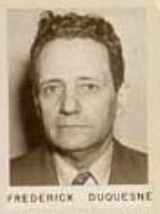
Espionage
Espionage is the practice of surreptitiously obtaining information about an organization or a society that is considered secret or confidential.
Sourced
- And we did have fun. For five years we bugged and burgled our way across London at the State's behest, while pompous bowler-hatted civil servants in Whitehall pretended to look the other way.
- Peter Wright, "Spycatcher" (Heinemann, 1987), p. 54
- Because something is not what it is said to be, Ma'am, does not mean it is a fake. It may just have been wrongly attributed.
- A Question of Attribution by Alan Bennett.
- Said by Anthony Blunt, who was Surveyor of the Queen's Pictures and a Soviet agent.
- Indeed, there may well be many who will agree that death by hanging is almost too good for a sailor who will encompass the death of thousands of his shipmates without qualm.
- "Camp 020: MI5 and the Nazi spies" (Public Record Office, 2000), p. 198
- Lt-Col Robin Stephens, Commandant of Camp 020, in a report recommending no reprieve from sentence of death for Duncan Scott-Ford who had admitted communicating information about Allied ships to German agents. Scott-Ford was hanged.
- Mrs O'Grady has been sentenced to death. Personally I doubt whether she is guilty of anything more than collecting information. She probably pictured herself as a master spy, and cannot bring herself to say that there was really nothing behind it all.
- Guy Liddell, diary entry, 17 December 1940. Refers to Pamela O'Grady, an Isle of Wight landlady; on appeal her sentence was reduced to fourteen years' imprisonment. Guy Liddell was Director of Counter-Espionage for MI5, the British Security Service.
- No spy, however astute, is proof against relentless interrogation. Some unforseen circumstance, some trivial lapse, is pounced upon, exploited by the interrogator, until a break is complete.
- "Camp 020: MI5 and the Nazi spies" (Public Record Office, 2000), p. 105
- Lt-Col Robin Stephens, Commandant of Camp 020 which was the secret British centre for interrogating suspected Nazi spies during World War II. Stephens aimed to get "a break" in which the spy would make a full confession, and almost always succeeded.
- The spies of the underworld are legion. Craven crooks, for the most part, they are prey to blackmail.
- "Camp 020: MI5 and the Nazi spies" (Public Record Office, 2000), p. 106
- Lt-Col Robin Stephens, who divided spies into three broad categories: patriots, of the underworld, and just mercenary.
- To MI5, if you steam this open you are dirty buggers.
- Peter Wright, "Spycatcher" (Heinemann, 1987), p. 46
- Letter sent to a prominent member of the Communist Party of Great Britain and opened by MI5. According to Wright, Major Denman (MI5 officer in charge of post interception) classified it as 'obscene post' (so that he was not required to send it on), framed the letter and put it on his office wall.
- what is espionage but the very thing we exercise daily in our lives?
- John Le carre
Unsourced
- There have been only two kinds of CIA secret operations: the ones that are widely known to have failed—usually because of almost unbelievably crude errors—and the ones that are not yet widely known to have failed.
- Edward Luttwak
